| Introduction |
|
I’m writing this introduction from meetings in Berlin – the Think20 Dialogue on Global Solutions associated with the G20 Germany 2017 – see link – and the Leadership Council of the UN Sustainable Development Solutions Network – see link. Although very important at the political and policy level, these high level summits seem far from the reality of life in rural Africa, although a major focus of these initiatives is addressing inequality. Last week I was in a remote part of the South-East Lowveld of Zimbabwe, discussing the problems faced by smallholder farmers in a drought-prone area on the edge of the Gonarezhou National Park. ...
Photo: Playing the game Kulayijana with local leaders and other stakeholders in Malipati, Zimbabwe
|
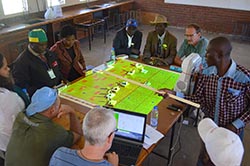 |
|
1 |
| We have revised the N2Africa website |
With so many articles and reports, extension materials and student theses emerging from N2Africa we realised that it was necessary to make it easier to find our outputs. For this reason we have revised the N2Outputs tab with clearer categories. If you have problems finding the information you need, or if you have suggestions for improvement of the website, please help us by contacting N2Africa.office@wur.nl.
|
2 |
| A woman business in Rwanda |
|
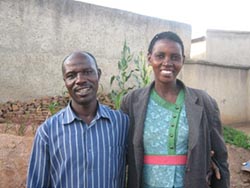
|
This story highlights the testimony of Mukakayonde Claudine, a woman from Mareba Sector, Rango Cell, Bugesera District. She is 47 years old, married to Manassé and they have six children. Her life has changed due to N2Africa project. It is told en French and summarized in English
Photo: Claudine et son mari Manassé
|
|
3 |
| Knowledge to reach greater heights in Rwanda |
|
Mr. Celestine as part of a farmer group called TWIZERANE started to work with N2Africa in 2010. Until this time, his group was only able to grow crops using traditional methods. ...
Photo: Mr. Gashirabake Celestine holding his certificate
|
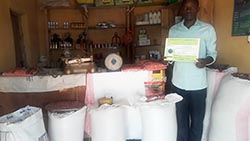 |
|
4 |
| Farmers’ stories from D.R. Congo |
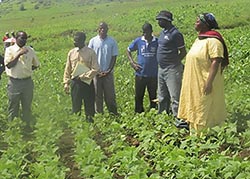 |
One of the strategies to disseminate research results of N2Africa at scale in South Kivu, Eastern DRC, has been the training of students of agriculture high schools in the N2Africa action sites. The trained students in turn train households in their villages. This article contains the stories of three farmers about how the learned about N2Africa’s technologies and the impact on their livelihoods.
Photo: Appoline Mapendo (lady on the right)
|
|
5 |
| Increasing legumes harvest with inoculant: The story of AISL, Malawi |
|
New agricultural technologies help to innovate and modernize agricultural production in the light of climate change and soil degradation. Research has confirmed that the addition of inoculant to soyabean can boost yields with at least 40 % to 50 % with all other factors kept equal. Another target is to develop improved inoculant products and cost-effective production and delivery methods. ... See the stories of Mr. Kawalewale and Ms. Matiasi.
Photo: “I will harvest more this year” Proud soyabean farmer, Natalia Matiasi showing her harvest for 2016/17 season
|
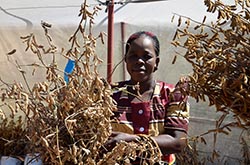 |
|
6 |
| Bean-rhizobia symbiosis in Kenya - snippets from a PhD study funded by N2Africa |
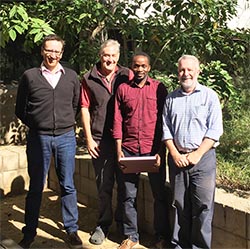 |
One strategy by the N2Africa project to enhance legume productivity in Africa was to select rhizobial strains with enhanced biological nitrogen fixation (BNF) efficiency from the various countries (as part of the GL x GR x E x M framework) for use as inoculants. In line with this goal, I isolated rhizobia from beans growing in several agro-ecologies in Kenya and first assessed their genetic diversity. ...
Photo: Dr George Mwenda (second from right) with PhD supervisors (all from the Centre for Rhizobium Studies at Murdoch University, Perth, Australia). Supervisors from left to right are Dr Jason Terpolilli, Prof. John Howieson, and Dr Graham O’Hara
|
|
7 |
| Application of phosphorus fertilizer and rhizobium inoculation improves grain and haulm nutritional values of selected grain legumes in the mixed crop-livestock production system of Ethiopia |
|
Grain legumes are the second largest cultivated crops in Ethiopia next to cereals in terms of total production volume yield and area coverage. A similar scenario is reported for annual crop residue production from grain legumes. But both grain and haulm production from grain legumes are below their potential and need to be improved through different approach like developing new varieties and adhering to better agronomic practices to exploit the genetic potential of the plants. ...
Figure: Sample processing and analysis for quality parameters at Animal Nutrition Laboratory of ILRI, Addis Abeba, Ethiopia
|
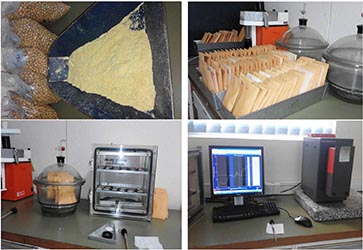
|
|
8 |
| Light and nutrient capture by common bean and maize in the Northern Highlands of Tanzania |
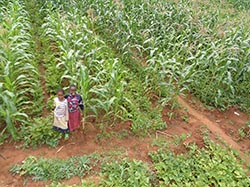 |
Beans and maize are important food and cash crops for farmers in the Northern highlands of Tanzania. They are often intercropped to achieve efficient land use, to avoid risk and to improve soil fertility. Farmers commonly alternate the rows of maize and beans one-by-one – or moja-moja in Swahili. ... |
|
9 |
| Radio for channelling information |
| On the 30th of March 2017, N2Africa and a group of other Bill & Melinda Gates Foundation funded agronomy projects with a focus on maize, cassava, highland banana and legumes came together with Farm Radio International. All these partners met to share their knowledge and predictions about soils, crops and yields, and Farm Radio International aims to communicate this information to farmers at scale. ... |
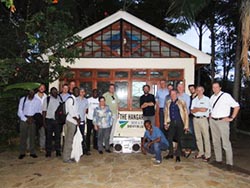 |
|
10 |
| N2Africa publications |
“Effectiveness of rhizobia strains isolated from South Kivu soils (Eastern D.R. Congo) on nodulation and growth of soybeans (Glycine max)”, written by Bintu Nabintu Ndusha, Nancy K. Karanja, Paul L. Woomer, Jean Walangululu, Gustave N. Mushagalusa and Jean Marie Sanginga, has been published in the March, 2017 issue of African Journal of Soil Science.
|
11 |
| Other N2Africa activities |
As mentioned in the previous Podcaster Ken Giller presented N2Africa in a WUR talk. The link to this WUR talk is available on YouTube.
|
12 |
| N2Africa in the news |
IITA news: Partnerships for perpetuity: N2Africa consolidates PPPs as plans for exit strategy progresses;
|
13 |
| Related publications |
Peter Goldsmith of the University of Illinois who coordinates the Soybean Innovation Lab sent us a link to an article that reports a new world record yield of 11.48 t/ha for soyabean;
Duncan Sones shared ASHC’s Northern Ghana Soybean Technical Brief 2017.
|
14 |
| Related newsletters |
|
15 |
| Announcements |
The West Africa Fertilizer Agribusiness Conference, Accra, Ghana, 10-12 July 2017, mentioned in the previous Podcaster now has a link to his years’ event.
|
16 |










